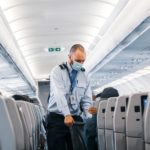 The International Air Transport Association (IATA) welcomed new guidance from the European Aviation Safety Agency (EASA) removing its recommendation that masks should be required in flight.
The International Air Transport Association (IATA) welcomed new guidance from the European Aviation Safety Agency (EASA) removing its recommendation that masks should be required in flight.
EASA’s updated Aviation Health Safety Protocol, published on 11 May, calls for the mandatory mask rule to be relaxed where rules have been relaxed for other transport modes. This important shift reflects the high levels of vaccination, natural immunity levels, and the removal of domestic restrictions in many European nations. The updated guidance also acknowledges the need to move from an emergency situation to a more sustainable mode of managing COVID-19.
“We welcome EASA’s recommendation to relax the mask mandate, which is another important step along the road back to normality for air passengers. Travellers can look forward to the freedom of choice on whether to wear a mask. And they can travel with confidence knowing that many features of the aircraft cabin, such as high-frequency air exchange and high-efficiency filters, make it one of the safest indoor environments,” said Willie Walsh, IATA’s Director-General.
Several jurisdictions still maintain mask requirements. That is a challenge for airlines and passengers flying between destinations with different requirements. “We believe that mask requirement onboard aircraft should end when masks are no longer mandated in other parts of daily life, for example, theatres, offices or on public transport. Although the European protocol comes into effect next week, there is no globally consistent approach to mask-wearing onboard aircraft. Airlines must comply with the regulations applicable to the routes they are operating. The aircraft crew will know what rules apply and it is critical that passengers follow their instructions. And we ask that all travellers be respectful of other people’s decision to voluntarily wear masks even if it is not a requirement,” said Walsh.
Edited by: Stephen Morton
Guidance to Remove Mask Mandate a Step Towards Normality





















